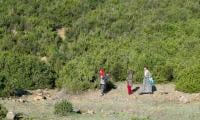that many Turkish voters no longer support the government’s policy towards the war in Syria.
It is possible that the war fervour that Erdogan is stirring following the suicide bombing, and Turkey’s entry into the anti-Isil fray, is an attempt to realign its policies to meet domestic expectations.
In fact, Turkey’s emboldened opposition parties are now accusing Erdogan of taking advantage of his popular move to strike Isil by taking on the outlawed Kurdistan Workers’ Party (PKK).
A clear link between Isil and the PKK has yet to be established, but many individuals accused of being affiliated with both groups have been rounded up in recent days.
It is also not clear how far Turkey is willing to go in its fight against Isil, and whether such a fight will include other jihadi groups – who are arguably as notorious as the brutal Isil fighters.
“Turkey has openly supported other jihadi groups, such as Ahrar al-Sham, which espouses much of Al-Qaeda’s ideology, and the Nusra Front, which is proscribed as a terror organisation by much of the US and Europe,” reported the Guardian, accusing Turkey of military cooperation with these groups, as well as economically sustaining Isil operations in Syria.
If Turkey is truly serious about delinking itself from these militant groups, will it change its entire outlook towards the conflict in Syria? Or is it simply a matter of divesting from Isil and seeking other alternatives?
Some analysts suggest that the Iran nuclear deal reached with the US and other major world powers might have instigated the shift in Turkey’s attitude. These analysts have a point. While Turkey is unlikely to change its whole strategic approach towards Syria overnight, at a time like this, it certainly cannot afford isolation from the US and its western partners or Iran and its allies.
After consistent resistance against joining the US-led coalition against Isil, Turkey has now agreed to allow the coalition access to its Incirlik Airbase. Now, Turkey is eager to appear to be working within the Nato apparatus, as well as with its regional alliances which had appeared to be weakening.
Turkey’s future strategy, which is undoubtedly linked to internal domestic factors, is likely to have profound consequences on Isil’s ability to survive in its current form, or even at all. The local dimension in Turkey’s newly started war on Isil should be of particular interest.
While Isil is a common denominator among various Middle East countries, each country seems to have a local component that serves as a native host for Isil. This was the case in Libya following the Nato-led war, and of course, was the case in Syria, Iraq, Somalia, and elsewhere.
As much of the Middle East sinks deeper into division between competing political camps, Isil continues its unhindered march towards a twisted version of a Muslim caliphate. Many thousands have lost their lives, some in the most torturous ways, so that Isil may realise its nightmarish dream.
Of course the violence meted out by Isil is hardly an anomaly considering that the group was spawned in a predominantly violent environment. It is difficult to imagine, for example, that if the Syrian regime and its opposition had sought a political solution from the early days of the uprising, Isil would have found a stable foothold for itself in Syria.
It was during the emergence of violence by the Syrian regime that Isil appeared. The same scenario was repeated in Iraq and a host of other countries. Long-time Middle East observer Patrick Cockburn highlighted seven countries where the influence of Isil was great or growing: Afghanistan, Iraq, Syria, Yemen, Libya, Somalia, and northeast Nigeria.
The group’s “successes have been possible because it is opposed by feeble, corrupt or non-existent governments and armies”, he wrote. However, very little emphasis has been placed on the root cause of the problem and its resulting violence.
Western governments and media are not the only party guilty of discussing the brutality of Isil outside proper political or socioeconomic contexts; Arab governments and media are also invested in misconstruing the narrative. Arab countries’ official media outlets often misinterpret each crisis in the region in order to justify their own foreign policy or military adventures.
Yemen, which has undergone several stages of political crises – government corruption and violence, a popular uprising followed by a political stalemate, a civil war, and finally a regional war – is a case in point. Isil bombs targeting mostly houses of worship are now another staple in Yemen’s bloody conflict.
Isil thrives on conflicts and calamities that are rooted in poor, fragmented Arab societies, where youth are disenchanted with their governments and where they have little or no hope for the future due to corruption and the protracted violence. Such embitterment is a perfect recruiting ground for Isil, which enjoys multiple revenue streams and a self-sufficient economy.
Of course, more violence is seldom the solution, as the ‘Arab Spring’ amply demonstrated. In fact, the ferocity and ruthlessness of the many conflicts currently under way in the region have achieved little, aside from setting the stage for extreme polarisation in political, ideological, and sectarian discourses.
If genuine, Turkey’s entry into the war arena against Isil should not rely entirely on firepower. Instead, it should be part of a larger regional push aimed at addressing the political, economic, and even sectarian fault-lines that allowed Isil to form and thrive in the first place.
This article originally appeared as: ‘The deep roots of Turkey’s war on Isil’.
Courtesy: Aljazeera.com
There are over 11 million Pakistanis settled abroad, out of which around six million work in Gulf and Middle East
This year alone, US Treasury would have to roll-over $10 to $14 trillion in maturing short-term debt
Tear gas no longer marks just protest sites; it paints entire cities as battlegrounds but then again, PTI did it first
Political structures and governance systems have been central to economic and social development
It is confirmed now 40 Pakistanis had died after boat of migrants had capsized in sea near Greece
Many people believe that in future, AI will play an even more significant role in their lives







